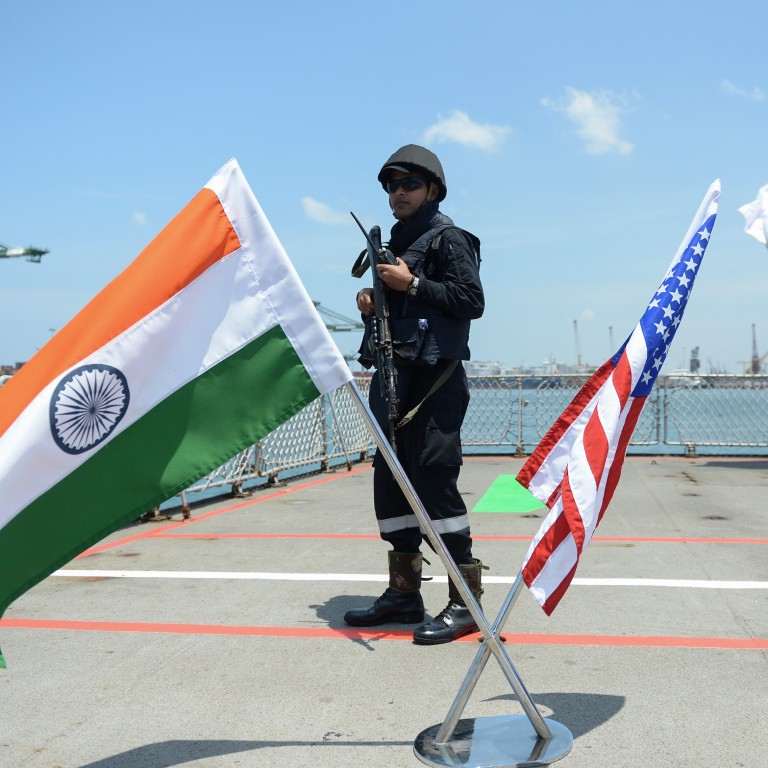
China right to be concerned about Quad alliance’s bright future, analysts say
- After unpromising beginning, US, Japan, India and Australia grouping is finding renewed common ground against Beijing
- Revival coincides with increasingly tense relations on a growing range of issues between the four countries and China
China and India had just agreed to back away from their months-long military stand-off in the Himalayas, while a trade war with the US seemed to be merely rhetorical. And diplomats in Beijing and Tokyo were busily preparing for an ice-breaking trip to Japan by Chinese Premier Li Keqiang for the 40th anniversary celebrations of the two countries’ peace and friendship treaty, after a decade of confrontation.
Two years later, the Quadrilateral Security Dialogue – to give the Quad its full title – is steadily advancing cooperation between the four countries, with renewed interest in the grouping from India and Australia, which are each experiencing friction in their relations with China.

06:24
Explained: the history of China’s territorial disputes
Australia’s participation was announced just days after the Quad’s foreign ministers held an inaugural four-way summit in Tokyo where they also discussed supply chain resilience in the Indo-Pacific region as part of a joint effort to counter China’s trade dominance.
The renewed momentum is in sharp contrast to the early days of the Quad – first proposed by Japan’s then prime minister Shinzo Abe in 2007 – which quickly fell apart after Australia and India stepped back in response to protests from Beijing.
“At the beginning the [Quad] mechanism was not only about security, it also had an economic dimension in the Indo-Pacific region. But recently it has become more and more focused on security, with China as the potential rival,” said Wu Shichun, president of China’s National Institute for South China Sea Studies, a government-backed think tank.
Will closer India-Australia ties boost Indo-Pacific ‘Quad’ grouping?
India also appeared to have changed its mind about the Quad, particularly in the light of its renewed border dispute with China in the Himalayan region, Lee said.
New Delhi had long been reluctant to follow the other three countries in their converging views on China over concerns Beijing could retaliate with border action or through support for India’s fierce rival Pakistan, she said.
“New Delhi has realised that China will continue to push to change the status quo on its border with India, and previous attempts by India to smooth over relations have not changed this aim.”
China kits out army for winter combat as India border dispute drags on
The latest revival of the Quad comes at a time of strained relations between the US and China, and Washington has been the driving force behind it in recent months, according to William Choong, a senior fellow at ISEAS-Yusof Ishak Institute in Singapore.
During the Tokyo summit earlier this month, US Secretary of State Mike Pompeo appealed for like-minded democracies to counter what he called the Communist Party’s “exploitation, corruption and coercion”. The other three foreign ministers refrained from mentioning China, but observers said Beijing had reason to worry.
“That’s the general principle – that China has suspicions over any multilateral arrangement involving major powers surrounding China – and the Quad would tick all the right boxes,” Choong said.
Beijing has appeared to play up its concerns over Washington’s Indo-Pacific strategy and the Quad. Last month, China’s deputy foreign minister Luo Zhaohui described the grouping as “an anti-China frontline” or “mini Nato”, which he said reflected America’s “cold war mentality”.
Pompeo asks ‘Quad’ allies to stand against China’s ‘coercion’
Derek Grossman, a senior defence analyst with Rand Corporation, said Beijing’s changing tone could shed light on its increasing unease that “the Quad could actually wind up amounting to a military alliance that would cause China trouble in future combat”.
“On the other hand, and to be more cynical, Beijing may not be worried about the Quad at all, but it nevertheless makes sense to play up the threat – especially using the term ‘Nato’ to describe it – to fuel China’s containment narrative and convince others of the Quad’s ill intentions,” he said.
It remains an open question how far or how soon the grouping may be formalised as a treaty alliance like Nato, but observers in the region said that would largely depend on Beijing.
In contrast to 2007 when it was given an early burial, the future of the Quad seems bright with the four countries sharing deep concerns over Beijing’s growing influence and increasingly aggressive and assertive behaviours in the region.
China-India border dispute: its origins and impact
Joint efforts are now seen as “not a choice but a national security imperative” to contain Beijing’s aggressive postures in the region, said Harsh Pant, head of the strategic studies programme at the Observer Research Foundation in Delhi.
“If China’s foreign policy trajectory remains what it is, then the future of Quad is quite bright. There is a wider pushback against China across the region, and Quad is just another manifestation of that trend,” he said.
But Choong said the US presidential election would also play a role in determining the fate of the Quad.
“If the polls are right and Biden becomes president, I think the new administration will put some time into re-evaluating the Quad and Indo-Pacific strategy in general, and how the US will work with allies and partners on the issue of China,” he said.

